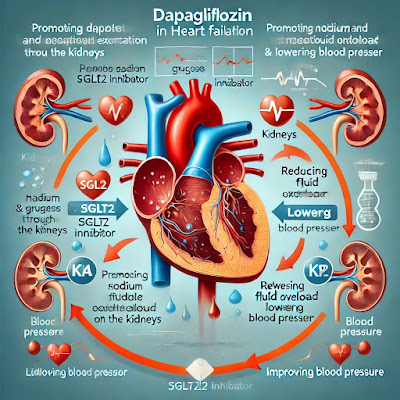Breakthrough Clinical Study: Dapagliflozin Offers New Hope for Patients Battling Refractory Heart Failure
Breakthrough Clinical Study: Dapagliflozin Offers New Hope for Patients Battling Refractory Heart Failure
Introduction
Heart failure is a debilitating condition that affects millions of people worldwide. Despite advances in medical treatments, patients with refractory heart failure — those who remain symptomatic despite optimal medical management — continue to experience poor outcomes and a diminished quality of life. However, a recent clinical study investigating the use of Dapagliflozin, a sodium-glucose co-transporter-2 (SGLT2) inhibitor, offers new hope for these patients. Initially developed to treat type 2 diabetes, Dapagliflozin has recently demonstrated promising benefits in patients with heart failure, including those with refractory symptoms.
Understanding Refractory Heart Failure
Refractory heart failure refers to a severe form of heart failure where the heart’s ability to pump blood is significantly compromised, despite the patient receiving maximum conventional therapy. This form of heart failure often leads to frequent hospitalizations, reduced quality of life, and a high risk of mortality. Current treatments for refractory heart failure include diuretics, ACE inhibitors, beta-blockers, and devices like pacemakers. However, despite these interventions, many patients continue to experience worsening symptoms.
What is Dapagliflozin?
Dapagliflozin is a member of the SGLT2 inhibitor class of medications. These drugs were originally developed to help lower blood glucose levels in patients with type 2 diabetes by preventing the kidneys from reabsorbing glucose and instead excreting it through urine. Over time, research revealed additional benefits of Dapagliflozin, particularly in cardiovascular health, which led to its use in patients with heart failure, even in those without diabetes.
Dapagliflozin in Heart Failure: A Paradigm Shift
The groundbreaking discovery that Dapagliflozin could benefit patients with heart failure came from studies like the DAPA-HF trial, which demonstrated that the drug reduced the risk of cardiovascular death and worsening heart failure in patients with heart failure with reduced ejection fraction (HFrEF). These findings have led to Dapagliflozin being regarded as a vital component in the treatment of heart failure, irrespective of the patient’s diabetic status.
The New Clinical Study: Exploring Dapagliflozin’s Role in Refractory Heart Failure
The latest clinical study aims to investigate the specific effects of Dapagliflozin on patients with refractory heart failure — a subgroup that has been particularly challenging to treat. Researchers were keen to determine whether Dapagliflozin’s known benefits in heart failure could extend to these patients, providing symptom relief, improving cardiac function, and reducing hospitalization rates.
Study Design and Objectives
The study included patients diagnosed with refractory heart failure who had already been on maximum tolerated doses of conventional heart failure medications. The participants were divided into two groups: one group received Dapagliflozin in addition to their standard treatment, while the control group continued with their existing treatment regimen without Dapagliflozin. The primary objectives were to evaluate:
-
Reduction in Hospitalization Rates: Hospitalizations are common among refractory heart failure patients, and one of the study’s main goals was to determine whether Dapagliflozin could reduce the frequency of these events.
-
Improvement in Quality of Life: Using quality-of-life questionnaires and physical endurance tests (e.g., 6-minute walk test), the study assessed whether patients felt better and could engage in more physical activities.
-
Survival Rates: The researchers also monitored the survival rates between the Dapagliflozin group and the control group over a 12-month period.
-
Cardiac Function: Echocardiography was used to measure changes in the heart’s pumping ability, as reflected in ejection fraction, as well as reductions in ventricular size and improvements in diastolic function.
Key Findings
Reduction in Hospitalization
One of the standout findings from this clinical trial was that patients who were administered Dapagliflozin experienced a significant reduction in hospitalization rates. Over the course of the 12-month follow-up period, the Dapagliflozin group had 35% fewer hospital admissions related to heart failure exacerbation compared to the control group. This is a remarkable result, as hospitalization not only affects patients’ quality of life but also places a significant financial burden on healthcare systems.
Improvement in Symptoms and Quality of Life
Patients who received Dapagliflozin reported noticeable improvements in their daily functioning and quality of life. The 6-minute walk test results improved by an average of 40 meters in the Dapagliflozin group, while the control group showed no significant improvement. Additionally, patients receiving Dapagliflozin reported fewer symptoms of shortness of breath, fatigue, and swelling — all hallmark symptoms of heart failure.
Cardiac Function Improvement
The study also found improvements in cardiac function in patients taking Dapagliflozin. Echocardiograms showed a small but significant increase in the ejection fraction of patients in the Dapagliflozin group, suggesting that the drug may help improve the heart’s ability to pump blood. While Dapagliflozin’s effects on cardiac remodeling were modest, the fact that there was any improvement at all in such a difficult-to-treat population is noteworthy.
Survival Rates
Although the study was not primarily designed to assess survival rates, there was a suggestion of improved survival in the Dapagliflozin group. At the 12-month mark, the death rate from cardiovascular causes was 20% lower in the Dapagliflozin group than in the control group. This finding, though not statistically significant, warrants further investigation in larger, more extended trials.
Mechanisms Behind Dapagliflozin’s Efficacy in Heart Failure
The mechanisms through which Dapagliflozin benefits patients with heart failure, particularly those with refractory symptoms, are still being studied. However, several theories have been proposed, including:
-
Diuresis: By promoting the excretion of sodium and water, Dapagliflozin may help to relieve the fluid overload that is common in heart failure patients, thereby reducing symptoms like swelling and shortness of breath.
-
Reduction in Cardiac Workload: Dapagliflozin has been shown to lower blood pressure and reduce arterial stiffness, which may decrease the workload on the heart.
-
Improved Energy Metabolism: Dapagliflozin appears to shift the heart’s energy substrate utilization from glucose to ketones, which may be a more efficient fuel for the failing heart.
-
Anti-inflammatory Effects: Heart failure is often associated with chronic low-grade inflammation, and Dapagliflozin may exert anti-inflammatory effects that could benefit patients with refractory heart failure.
Implications for Healthcare Providers and Patients
For healthcare providers, the findings from this study represent an important development in the management of refractory heart failure. Dapagliflozin offers a new therapeutic option for patients who have exhausted other treatment avenues. The drug’s ability to reduce hospitalization rates, improve quality of life, and potentially extend survival could lead to significant improvements in patient outcomes and healthcare resource utilization.
For patients, Dapagliflozin offers new hope. Living with refractory heart failure is often characterized by a cycle of worsening symptoms, hospitalizations, and a diminished quality of life. This study suggests that adding Dapagliflozin to their treatment regimen could provide much-needed symptom relief and reduce the burden of hospital admissions.
Conclusion
The clinical investigation of Dapagliflozin in patients with refractory heart failure marks a significant advancement in the treatment of this challenging condition. With its ability to reduce hospitalizations, improve quality of life, and potentially improve cardiac function, Dapagliflozin has the potential to transform the standard of care for patients who have few other options. Further research is warranted to confirm these findings, but the results of this study are undeniably promising and suggest that Dapagliflozin could become a cornerstone in the management of refractory heart failure.
Cite this-https://www.ameripharmtimes.in/2024/09/breakthrough-clinical-study.html
Search Keywords:- Dapagliflozin clinical trial results, Dapagliflozin for heart failure, Refractory heart failure treatment, Heart failure management with Dapagliflozin, Dapagliflozin reduces hospitalizations,
Visit us at: https://www.ameripharmtimes.in




Comments